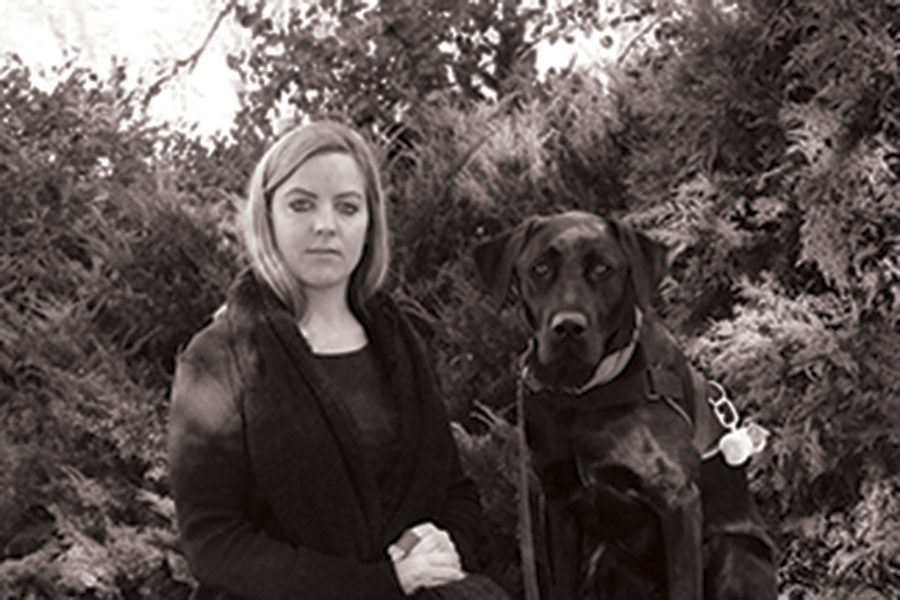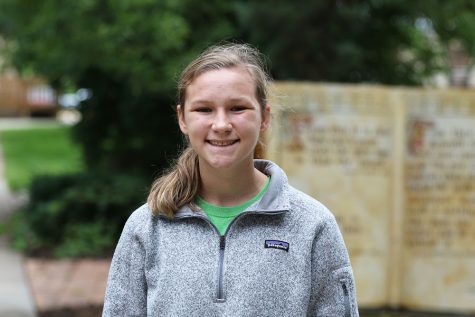A helping paw
As a service dog, Victor has positively impacted both ELL teacher Jessica St. John and the West High community.
Victor has been Jessica St. John’s service dog since June.
November 20, 2018
While strolling past the ELL classrooms, you may have noticed an unfamiliar face sauntering by on four paws in a small, black vest. Your very first instinct may have been to pet him or to call out his name, just like any other pet. However, many are unaware that those actions are not allowed and that the black Labrador roaming around isn’t even a pet. The two year-old is actually a service dog named Victor who works with ELL teacher Jessica St. John.
St. John met Victor through a program she volunteered with called Retrieving Freedom, an organization that trains and breeds service dogs. She began volunteering upon struggling with Post-Traumatic Stress Disorder (PTSD) after working as a military police officer with detainees and convoy escorts for eight years in Afghanistan. It was that experience that gave her the opportunity to work with service dogs and eventually have one of her own.
“I was called on the telephone by Retrieving Freedom and they said, ‘We have the perfect dog for you. I think you need to come and meet him.’ I said okay and I went down there and I met Victor,” St. John said.
Having had Victor for more than five months now, she has gotten very familiar with Victor’s personality.
“He’s very calm and well-behaved. However, he is very playful and energetic, so he has two sides to him,” St. John explained. “[He] trains with the vest so he knows this is when you’re working and out in public versus when you’re at home or somewhere where he can relax and let his energy up.”
Victor’s parents were purebred dogs with good temperaments. After birth, he was sent to a foster home for eight weeks.
“It’s not like a typical animal foster home. It’s families who are trained to teach basic training like sit, lay down and all those good manners. After one year, they go back to the Retrieving Freedom facility to do another year of training,” St. John said. “Once a dog has partnered with who they’re going to be a service dog for, they have to do training with that person.”
During Victor’s foster home experience, he had the opportunity to be a ‘student’ at many different schools.
“Victor’s foster was actually a kindergarten teacher, so [Victor] was in kindergarten for almost two years. He [also] went to college and did a leadership class with Wartburg students,” St. John said. “He’s actually named after [the] Wartburg mascot, Sir Victor. That’s why he’s famous.”
Victor is now at West High, but is specifically there to support St. John and thus doesn’t have a big role with the students. However, St. John still likes to make sure that Victor plays a small part in the classroom.
“I have students who have been through traumatic experiences and he kind of just takes the edge off the class. Kids can just feel more at home by [him] being here,” St. John said.
Nevertheless, there are certain rules that students must follow when interacting with Victor.
“In the hallway or other places you cannot walk up to Victor and pet him. You should never call his name. You’re not supposed to really pay attention to him, because that distracts him from his job,” St. John said. “It’s hard to get people not to touch him or to not call him because it’s really distracting.”
This is especially true whenever St. John takes Victor outside of school and the home.
“Usually when I’m out in public, it’ll be hard to go anywhere without people stopping me and asking me a hundred questions,” St. John explained. “Ten minute trips to Walmart turn into an hour. Random strangers constantly ask me questions, but it’s good because it’s a learning experience.”
Despite the seriousness of Victor’s job, he isn’t always in service dog mode, especially when interacting with other dogs.
“He’s very well socialized. He can tell which dog wants to play with him and which dog doesn’t; if a dog seems too aggressive, he’ll ignore it,” St. John said. “I think one of the most helpful things is how social he is, because he can play with dogs of all sizes.”
Victor, however, wasn’t St. John’s first service dog. Before him, she also worked with Rosie, a black Labrador who had a contrasting personality to that of Victor.
“One time she saw a duck and jumped out the window of my car driving down the road. That automatically doesn’t qualify her to be a service dog, so I had to give her back to Retrieving Freedom and they found her a home as a pet,” St. John said.
Unlike Rosie, Victor is able to better meet St. John’s needs in coping with her PTSD.
“Typically when I’m at home alone or somewhere in the dark, he kind of lets me know what things are happening so I don’t have to be on high alert every time I hear a sound,” St. John said.
Victor’s services also apply when St. John encounters strangers.
“When I’m traveling, or if I’m walking late at night, I just feel a little more secure because people think twice about approaching someone with a dog,” she explained. “Whenever I feel uncomfortable standing next to someone, I’ll say, ‘Victor, behind’ and he’ll go behind me. He doesn’t really know what he’s doing, but he’s creating space between me and the person behind so [that person] is not threatening [to me].”
Since St. John began working with Victor full-time, she’s had to adapt to a significantly new lifestyle.
“Anytime you take something on full-time with you, it’s a big difference, kind of like having a kid with me all the time,” St. John said. “Until you get used to it, it’s a little more stressful, but once you become comfortable with the dog, you start to reap more of the benefits.”







